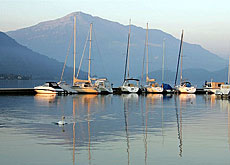
Zug denies tax system violates agreement

Canton Zug has denied that its low corporate tax rates contravene a 1972 Free Trade Agreement between Switzerland and the European Union.
Cantonal officials told swissinfo they were surprised at the European Commission’s External Relations Directorate-General making the allegation in a letter to the Swiss authorities.
The letter, dispatched to the Swiss Mission in Brussels on September 26 but only made public last week, congratulates Switzerland for voting the previous day to extend the free labour accord to the new European Union member states.
But it goes on to say: “It has been brought to the attention of the Commission that certain corporate tax regimes applied to undertakings in Switzerland may be incompatible to Switzerland’s obligations under the agreement, in particular article 23.
“The legislation in question, that is enforced in Zug and [canton] Schwyz, is said to grant fiscal advantage to undertakings for… economic activities taking place outside Switzerland.”
Guido Jud, head of corporate tax in canton Zug, told swissinfo that he could not understand why the Commission was turning up the heat on Zug.
“We are a bit surprised by this letter because it refers to the Free Trade Agreement of 1972. The rules on taxation in Switzerland have not changed recently so we do not see why, in 2005, there should be suddenly be a problem,” he said.
“We do not see it as a particular problem for canton Zug as we do not have different taxation rules from other cantons. All 26 cantons are bound by the Tax Harmonisation Act legislation.
“It is a part of Swiss tradition that cantons have autonomy to set their own taxes. It is part of Switzerland’s success that there is tax competition among the cantons.”
Switzerland’s cantons are free to set their own tax levels within the framework of the federal Tax Harmonisation Act, brought into force in 2001.
Attracting business
Zug and Schwyz are among the cantons to take advantage of this autonomy by setting low corporate tax rates to attract international companies to set up base. The combined federal, cantonal and communal tax rate for companies in Zug ranges from 14 to 17 per cent.
The Swiss Business Federation, economiesuisse, warned that attempts by the European Commission to meddle in Switzerland’s tax regulations would not go down well with the Swiss people.
“At first sight we do not see how cantons operating a low taxation system infringes on article 23 of the Free Trade Agreement. It is a matter of interpretation,” spokesman Pascal Gentinetta told swissinfo.
“The Swiss people would have problems with the Commission trying to find fault with the tax authorities of the cantons.”
Swiss officials are due to meet counterparts from the Commission’s External Relations Directorate-General in December to discuss how the Free Trade Agreement is being implemented.
But the Commission and Switzerland’s EU Integration Office in Bern played down the significance of the letter, saying it was a general request for information rather than an official complaint.
The letter has been forwarded to the Swiss finance ministry, which refused to say any more than that it is studying the text.
Canton Schwyz said it would wait for the federal government to take a stance before commenting on the issue.
swissinfo, Matthew Allen
Article 23.iii of the Free Trade Agreement 1972 states that “any public aid which distorts or threatens to distort competition by favouring certain undertakings or the production of certain goods” is “incompatible with the proper functioning of the Agreement”.
The Tax Harmonisation Act was brought into force in Switzerland in 2001 to regulate cantonal taxation systems.

In compliance with the JTI standards
More: SWI swissinfo.ch certified by the Journalism Trust Initiative






























You can find an overview of ongoing debates with our journalists here . Please join us!
If you want to start a conversation about a topic raised in this article or want to report factual errors, email us at english@swissinfo.ch.